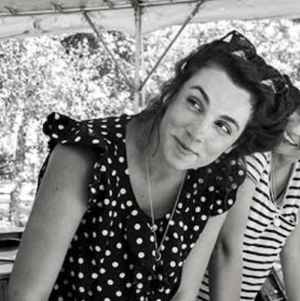Shakespeare’s 'As You Like It' Comes Alive in Third-Year Director’s Thesis
Mikhaela Mahony's third-year directing thesis As You Like It premieres next month at The Lenfest Center for the Arts.
“All the world’s a stage, and all the men and women merely players; they have their exits and their entrances; and one man in his time plays many parts.” This text from Shakespeare’s As You Like It is one of the most quoted speeches in the English language.
Mikhaela hopes to bring a new approach and a fresh vision to one of the most produced plays in the Shakespearean canon. With this production, she aims to focus on inviting the audience into the Forest of Arden and introducing them to a community of characters that have been exiled. She wants the audience to watch them wander around this new world where they learn that the power of love can overcome all odds.
We talked with Mikhaela about the upcoming production.
Tell us about As You Like It.
As You Like It follows a particular group of people from their life in an oppressive court to their exile in the Forest of Arden. It’s a story about breaking out of the norms you’re accustomed to and learning how to approach life, love, and community from the vantage point of your truest self. This play is unusual in the sense that, compared to other Shakespeare plays, very little “plot” happens (or plot as it is typically understood). The driving force of this play is different. It’s about discovery and exploration on a different kind of timeline.
What is it about Shakespeare’s work that you find to be relevant in today’s theatrical landscape?
Shakespeare is a playwright obsessed with humans — as long as humans feel the sensations of love, and hatred, and loneliness, Shakespeare will be relevant. We would like to believe we have evolved past the ugliness and messiness of the human experience of four-hundred years ago, but we have not. We are still encountering despotic leaders who expel their citizens for their beliefs. And yet we are also still witnessing the indomitable force of Life that is possible among communities, no matter the circumstance. Shakespeare provides a double vision: one eye on a time four hundred years ago, and one eye on now. The dream is, through this double vision, tha we’re able to imagine a future.
What do you find most challenging about working with a piece that has been so heavily produced?
As You Like It has so many ideas baked into it — it is Shakespeare’s answer to Elizabethan pastoral ideals. And so, walking into the rehearsal room or into opening night, people expect to see idyllic greenery and sheep and trees. The text itself, however, describes the forest a bit differently — with wind and ice and cold — and I was interested in exploring that forest a bit more rigorously.
Shakespeare theorists describe this as a plot-less play — I believe that is because this is a play about romantic love, a topic that we deride as being less important than war or politics. But love and sex are hugely dramatic, and ultimately one of the most sacred things people can attempt in their lives. Trying to find love — true, equal love between two people — is a courageous and terrifying act, and I wanted to create an As You Like It that dealt with love in a way that felt true to me, and true to love’s massiveness and immensity.
As You Like It will run from March 6 - 9 in the Flexible Performance Space at Lenfest Center for the Arts. The Directing Thesis production also features performances by: Alton Alburo, Patrick Dunning, Tamara Geisler, Lee Havlicek, Greg Hermann, Artem Kreimer, Kyle Leibovitch, David Littleton*, Eamon Murphy, Joe Muzick*, Jessica Niles, Malcolm Opoku, Mallory Osigian, Al Pagano*, Cheryl Pickett, Sean Stokes*, and Hiro Takashima.

Mikhaela Mahony is a director of theatre, opera and film. She believes in new contexts for old forms. She creates intimate spaces to experience classical music and texts anew, celebrating and interrogating humanity’s capacity to change. Past credits include Abby Rosebrock’s Dido of Idaho (Ensemble Studio Theatre), Verdi’s Rigoletto (Chautauqua Institution), and Alanna Coby’s Tiny Errors at the End of the Millennium as part of The Syndicated Festival. Summer, her debut as a film director, was an official selection at the Buffalo International Film Festival and FilmColumbia in Chatham, NY. Most recently, Mikhaela directed Ted Rosenthal’s new jazz opera, Dear Erich, with New York City Opera. She also helped develop a multi-media exploration of the artist Tina Modotti, and created a new adaptation of Sigmund Romberg’s operetta The Student Prince, with a book collaged from the silent film of the same name, the play Old Heidelberg by Wilhelm Meyer-Förster, and her own writing. She is a frequent collaborator with the playwrights at EST/Youngblood and a volunteer artist with the 52nd Street Project.
